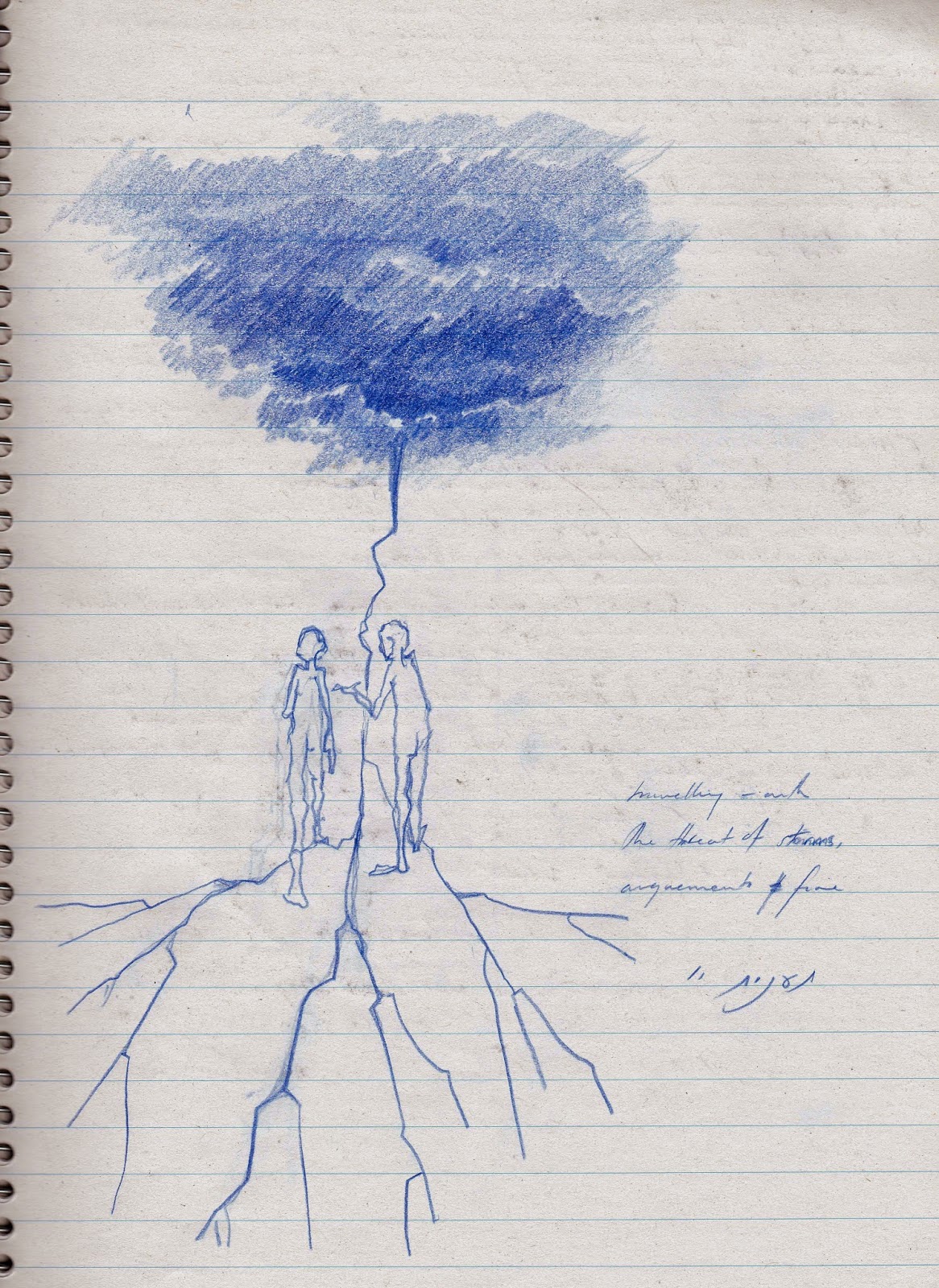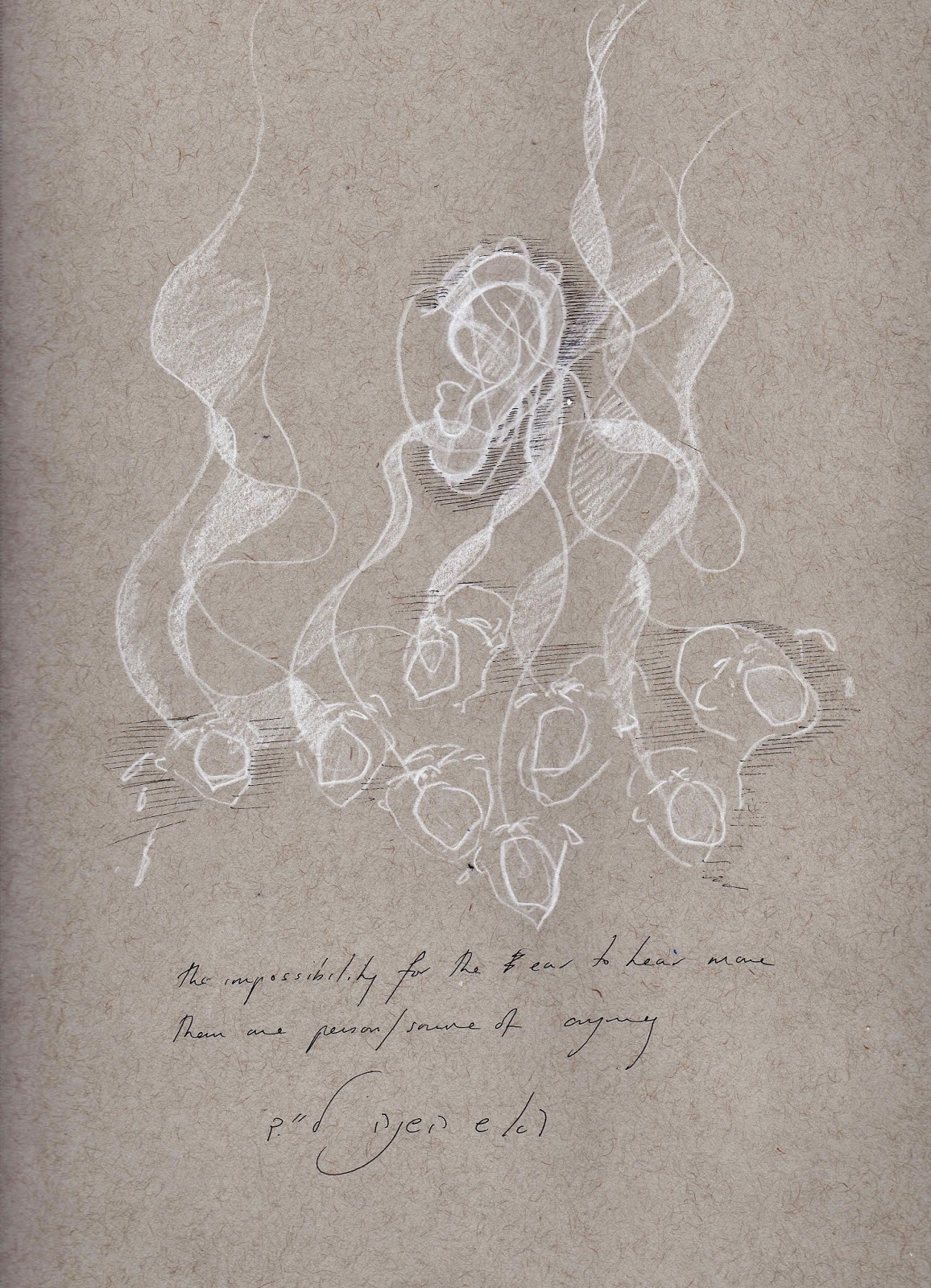long hair & wine
neither suitable for the temple
daf yomi is the discipline of learning a page of Talmud a day. draw yomi is an on-line project to follow the daf yomi cycle and to respond each day with a drawing.
Monday, 30 June 2014
ta'anit 16
the prayer leader must have children to feed and no money or food to give them - so he will pray for rain sincerely for all the vulnerable in the community.
ta'anit 15
the lesser is punished and cursed before the greater
so did Eve, the woman, see her man being disgraced publicly. Or was she in too much of her own pain?
so did Eve, the woman, see her man being disgraced publicly. Or was she in too much of her own pain?
ta'anit 14
if the air is already thick with swarming flying pests, don't need to full it with sound.
just cry to God
for droughts - the shofar was sounded as an alarm along with praying and crying to God.
but for plagues of locusts, flies, mosquitoes, hornets, snakes and scorpians - just crying to God - no shofar.
just cry to God
for droughts - the shofar was sounded as an alarm along with praying and crying to God.
but for plagues of locusts, flies, mosquitoes, hornets, snakes and scorpians - just crying to God - no shofar.
ta'anit 13
for some mourners, it is a time when the bathhouse is locked.
but for the older single woman, even when mourning, she must always look attractive for a potential husband.
always
for the older single woman there is no pleasure or joy in grooming and beauty.
but for the older single woman, even when mourning, she must always look attractive for a potential husband.
always
for the older single woman there is no pleasure or joy in grooming and beauty.
ta'anit 12
dreaming and fasting
fast to get rid of a bad dream
but stay awake during the fast, or else the fast doesn't count
only doze
fast to get rid of a bad dream
but stay awake during the fast, or else the fast doesn't count
only doze
ta'anit 11
who and what will testify if a person has fasted in private?
one's private space, soul, body,
or their two angels.
ta'anit 9
R. Yohanan tried to reach out and connect to his lost friend's son, the son who needed no teacher just his mother to protect him from any fatal contact with his uncle, R. Yohanan.
so R. Yohanan teaches that rain comes to the individual. the lonely, solitary individual.
R. Yohanan's story gets me every time. The man who lost his chavrutah - study partner/intimate friend - due to an argument. His partner died before they were reconciled and R. Yohanan went mad with grief and loss. The story on this page about the son is so poignant with R. Yohanan's longing to connect with his old friend. but the son speaks of Torah that he can derive from the verses himself, without need of anyone else. and so R. Yohanan teaches that rain comes for the sake of a worthy individual... A few years ago I had a study partner, stuff was said that should not have been said.... long story short - no one has died, or gone completely mad (although some days I do question my sanity...) and yet there is no reconciliation, nor chance of one. and this saddens me. and I miss my old friend. and from time-to-time during this draw yomi I come across something I want to discuss with them, hear their particular take on it, and then I remember I can't. and so whilst there are other people to learn with, I have also learnt not to depend on another, but to study on my own.
so R. Yohanan teaches that rain comes to the individual. the lonely, solitary individual.
R. Yohanan's story gets me every time. The man who lost his chavrutah - study partner/intimate friend - due to an argument. His partner died before they were reconciled and R. Yohanan went mad with grief and loss. The story on this page about the son is so poignant with R. Yohanan's longing to connect with his old friend. but the son speaks of Torah that he can derive from the verses himself, without need of anyone else. and so R. Yohanan teaches that rain comes for the sake of a worthy individual... A few years ago I had a study partner, stuff was said that should not have been said.... long story short - no one has died, or gone completely mad (although some days I do question my sanity...) and yet there is no reconciliation, nor chance of one. and this saddens me. and I miss my old friend. and from time-to-time during this draw yomi I come across something I want to discuss with them, hear their particular take on it, and then I remember I can't. and so whilst there are other people to learn with, I have also learnt not to depend on another, but to study on my own.
ta'anit 8
the rain is hidden and locked in the cloud. and the baby is hidden and locked up inside the mother. both paining to be released.
can only pray for things that are hidden and one thing at a time.
so, what gets released first - the rain or the baby?
can only pray for things that are hidden and one thing at a time.
so, what gets released first - the rain or the baby?
ta'anit 5
the frailties of physical bodies and moral decay - degenerate and depraved. descend into cannibalism, lust, premature aging.
so eat carefully, no talking
and perhaps Jerusalem below will be united with Jerusalem above.
so eat carefully, no talking
and perhaps Jerusalem below will be united with Jerusalem above.
ta'anit 4
the men with the iron-clad words and vows
that make the women vulnerable
this page discusses 3 cases of men who made unreasonable demands/bargains with God, whose consequence affected women. 2 of the cases, Eliezer setting up who will qualify to be the bride for Isaac, Saul marrying his daughter to whoever killed Goliath, these worked out well, but the last one - Jephath, vowing to sacrifice whatever greeted him on his return, not so good.
that make the women vulnerable
this page discusses 3 cases of men who made unreasonable demands/bargains with God, whose consequence affected women. 2 of the cases, Eliezer setting up who will qualify to be the bride for Isaac, Saul marrying his daughter to whoever killed Goliath, these worked out well, but the last one - Jephath, vowing to sacrifice whatever greeted him on his return, not so good.
ta'anit 3
the beneficial dew that rises from the ground
and the destructive wind that kicks up the dust of the earth
and the destructive wind that kicks up the dust of the earth
ta'anit 2
ta'anit means fast - and this section discusses the community fasts that are decreed in times of drought. it is part of the ritual of praying for rain, which begins around succot time. Ta'anit begins by discussing when these rain prayers should begin, at the beginning or end of succot festival. And describes there being a key to unlock the rain.
Since this mesechet is linked to succot I decided to do these drawings in blue pencil, to echo the blue biro drawings of mesechet succot.
Sunday, 29 June 2014
rosh hashana 35
when the act of crowning is a prayer
composed by the individual who lifts sentences off the pages of study and combines them into a chain of praise.
and act that is done as and when they want to - every 30 days should do it
composed by the individual who lifts sentences off the pages of study and combines them into a chain of praise.
and act that is done as and when they want to - every 30 days should do it
rosh hashana 33
the crying of a woman opened a window into the sound of the shofar
that remains silent in the hands of women
that remains silent in the hands of women
rosh hashana 31
the exiled heavenly spirit that ascends
and the exiled earthly court that descends
after the destruction of the first temple the shechinah travelled 10 stages of exile before finally ascending to heaven
after the destruction of the second temple, the Sanhedrin, travelled 10 stages to the lowest point.
and the exiled earthly court that descends
after the destruction of the first temple the shechinah travelled 10 stages of exile before finally ascending to heaven
after the destruction of the second temple, the Sanhedrin, travelled 10 stages to the lowest point.
rosh hashana 27
the clear and distinct sound and instrument
but it disintegrates and falls apart when broken
echoes and cracks
but it disintegrates and falls apart when broken
echoes and cracks
rosh hashana 26
the straight and the curved
the one with the straight body only understands words through a crooked path
but
the one with the curvy figure understands the words straight away
the one with the straight body only understands words through a crooked path
but
the one with the curvy figure understands the words straight away
rosh hashana 24
what in heaven and earth can be drawn, sculpted or replicated
and what should remain unique without replica or reminder
and what should remain unique without replica or reminder
rosh hashana 21
all the gates of understanding and wisdom are potentially open - except one...
and that might be the only one that counts
and that might be the only one that counts
Subscribe to:
Comments (Atom)






























